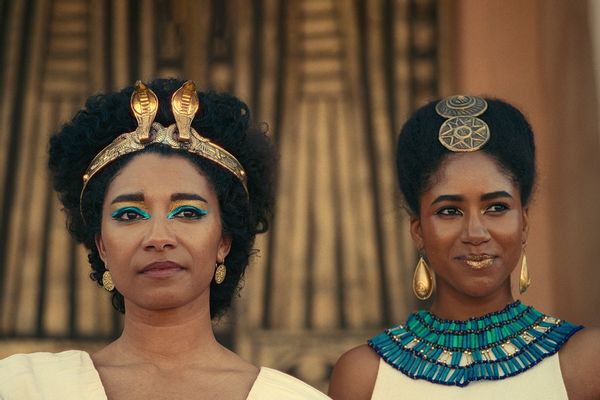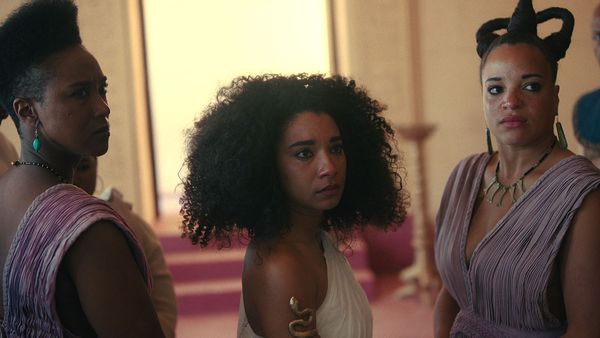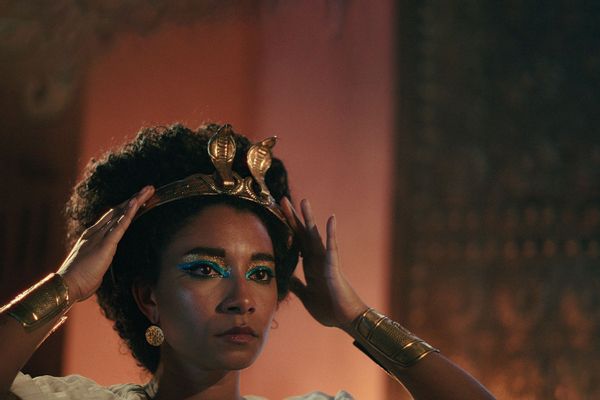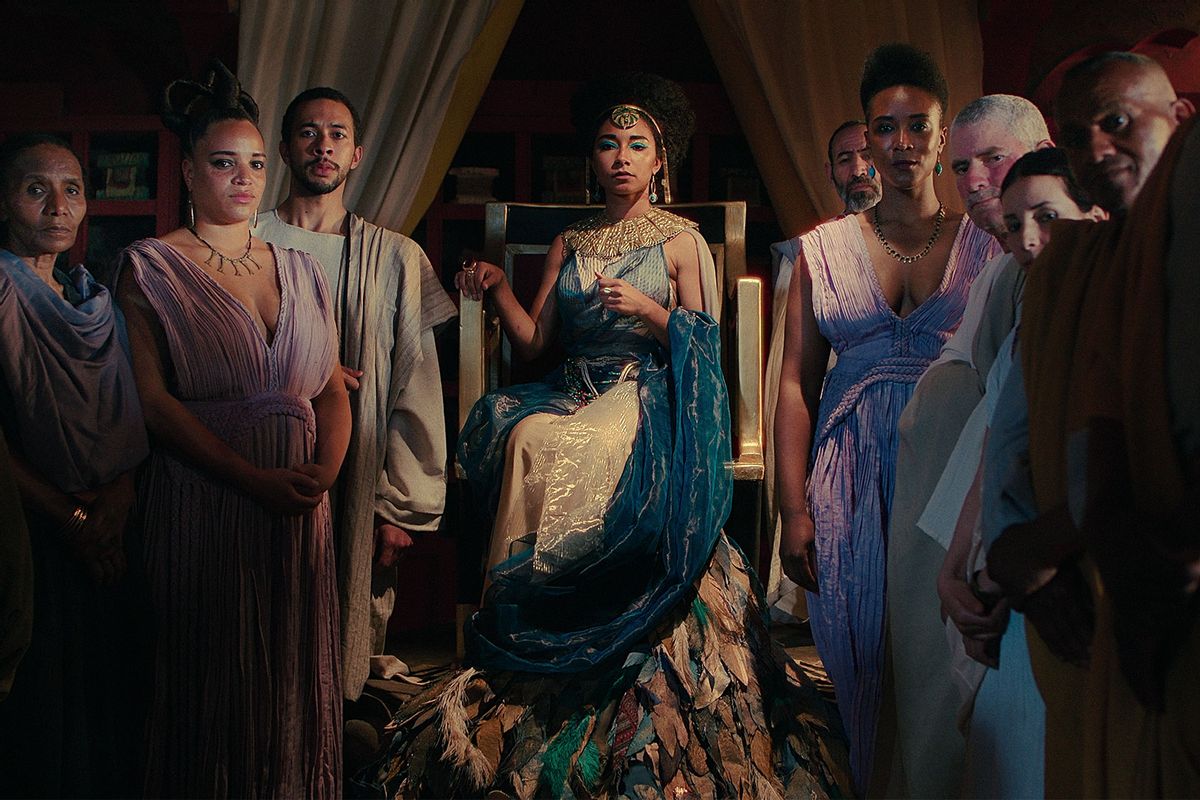Few creative selections kick conversational hornet's nests like a producer's decision to cast a person of color in a role long associated with whiteness. Choosing biracial actor Adele James to play Cleopatra VII, the star of the second season of "African Queens," should not have been one of them.
Cleopatra has inspired dozens of films either about her life or related to her legend, along with tens of operas and ballets. Her reputation was not diminished by her likeness starring in a commercial for vaginal douche. Surely the glamorous image of Egypt's last Pharoah can survive a worthy portrayal by a cast that happens to have more melanin in its collective complexion than Elizabeth Taylor did.
This underestimates how devotedly anti-Black Cleopatra's supposed image preservationists are. The "Queen Cleopatra" trailer's release in mid-April prompted an eruption among the usual right-wing trolls suddenly assuming ownership over anything related to the African continent. But it also moved an Egyptian lawyer to file a complaint alleging the hybrid docuseries violates the country's media laws and "promotes Afrocentric thinking," and a historian to invoke the ridiculous term "[B]lackwashing."
Making all things more equal, but not really, the news that Gal Gadot plans to don the Pharoah's crown in an upcoming movie elicited complaints about whitewashing.
Amid all the arguments about skin tone, perhaps it's worth asking whether we need another biographical examination of one of history's biggest celebrities.
As the series' executive producer and narrator, Pinkett Smith has the opportunity to showcase the Sub-Saharan queens who Western history has minimized or erased with the same production values, solid scripts, and skilled casts assigned to "African Queens: Njinga" and "Cleopatra."
I've namedropped Amina of Zaria before, but other rulers merit dramatization. Ethiopia's Makeda, for instance, popularly known as the Queen of Sheba. Surely people would appreciate a look at her reign. Kandake Amanirenas of Kush, located in what is now Sudan, successfully thwarted Rome's southward expansion into the continent after Egypt fell.
Their connection to familiar histories lends them marketability . . . theoretically. One can say the same of other Egyptian queens who came before Cleopatra, including Hatshepsut and Nefertiti. Nefertiti's story, like Cleopatra, is the subject of some debate too. But she wasn't a Hellenistic ruler immortalized by Shakespeare, removing her from the Greco-Roman foundation of classicism and, by extension, claims of whiteness.
Surely the glamorous image of Egypt's last Pharoah can survive a cast that happens to have more melanin in its collective complexion than Elizabeth Taylor did.
The critic in me generally favors examining the merits of a work of art as it is instead of wishing it were something entirely different. But "Queen Cleopatra" merits both approaches, along with pinpointing the business reasons we're seeing another take on her tale instead a different great Black woman's profile.
"Queen Cleopatra" provides decent coverage of commonly known facts about the ruler while playing up the qualities about her that have fascinated Western authors, artists and eventually Hollywood. (Did she sneak an audience with Julius Caesar by rolling herself up in a rug? Probably not. Did she die by clasping an asp to her cleavage? You'll have to watch to see what the experts think!)
 Queen Cleopatra (Courtesy of Netflix)
Queen Cleopatra (Courtesy of Netflix)
One welcome shift from past cinematic renderings is screenwriters Peres Owino's and NneNne Iwuji's emphasis on Cleopatra's shrewdness as a political and military strategist, traits often subsumed by her legend as a seductress. Understandable, since she had children with Julius Caesar and Caesar's lieutenant Mark Antony, whose death in her arms inspired future writers to romanticize their love story above the other. (Not for nothing, but in this "Cleopatra" Mark Antony (Craig Russell) is a scrub compared to Julius. Antony ghosted her for three years after she gave birth to his kids!)
Featured experts lending also provide dramatic context to scenes from Cleopatra's life and humanize the decisions she makes to secure power. None of their observations would change if she were played by someone other than an actor with a Black parent.
Those same experts also expend a lot of energy explaining how the final Ptolemaic ruler of Egypt and a Hellenistic descendent might also be a Black person. Since the identity of Cleopatra's mother was never established, no one can say with any certainty that she wasn't an Egyptian with darker skin.
Admittedly, that possibility is doing a lot of heavy lifting.
This enigma fits nicely with the marketing surrounding "Queen Charlotte" and its fictionalized realization of an inclusive British nobility. "Queen Charlotte" creator Shonda Rhimes reminds the viewer that her Black queen's story is fiction. "African Queens" dances into more fraught territory by presenting a straighter historic dramatization. But just like "African Queens: Njinga" surfaced in time to ride the viewership crest created by the arrival of "The Woman King" on the streamer, "Cleopatra" may latch onto the "Queen Charlotte" bump.
Still, in a time when opportunities to turn a bright light on untold stories are increasingly rare and narrowing, it's dispiriting to think that one half of a two-season order for "African Queens" was consumed by an examination of such a widely known figure.
Before watching the Cleopatra season I would have ended my argument here. And now? While I still wouldn't call it extraordinary from a production standpoint, it is worth digesting in ways people easily incensed by its Blackness would never countenance.
"Queen Cleopatra" shows what's possible when we question the perspective of those who typically present these histories and the reasons those people invest in ensuring they are told a certain way.
 Queen Cleopatra (Courtesy of Netflix)
Queen Cleopatra (Courtesy of Netflix)
Cleopatra's mystery lends itself to all kinds of assumptions, including those concerning her looks. Early and mid-century Egyptomania sparked recurring trends in makeup and fashion, two industries that tend to exclude people of color. That alone sheds some light on why so many who would otherwise ignore this casting choice are suddenly outraged to see her name linked to a Black woman. In the dominant culture's imagination Cleopatra is a paragon of attractiveness, and that same culture devalues Black beauty even as it appropriates its signifiers.
This "African Queens" installment also invites us to dig more deeply by way of the featured experts. Mind you, only historians who either subscribe to the theory that Cleopatra was Black or at least welcome it show up here, by Pinkett Smith's design. But if a person wanted to, they might look up the work of the academics featured, including Dr. Shelley Haley.
Want a daily wrap-up of all the news and commentary Salon has to offer? Subscribe to our morning newsletter, Crash Course.
Haley is the real breakout of Queen Cleopatra" for the way she animatedly recounts scenes from Cleopatra's life with the vibrancy of a professional storyteller. She knows how to connect the audience with this history on a human level, adding a sense of delight to Cleopatra's triumphs and irritation on her behalf related to Rome's disrespect.
"Queen Cleopatra" shows what's possible when we question the perspective of who typically presents these histories.
Haley is also a classicist who views the field from a Black feminist and critical race perspective. As she explains in her 1993 essay "Black Feminist Thought and Classics: Re-membering, Re-claiming, Re-empowering," since the foundational texts of the field are based on translations by white men, blindly trusting their interpretation of history impoverishes other perspectives and the ways we're taught to view ourselves.
The professor is fluent in Latin, and in her essay demonstrates what she means by presenting a white male scholar's denigrating translation of a Black woman's description from the original Latin text. Then she translates the same passage, yielding a more straightforward meaning: "belly somewhat pinched" becomes "stomach flat and firm," for example.
Reframing Cleopatra, she believes, necessitates reassessing previous accounts accepted as settled fact. Doing this acknowledges another cultural significance too:
In the Black oral tradition, Cleopatra becomes a symbolic construction voicing our Black African heritage so long suppressed by racism and the ideology of miscegenation. When we say, in general, that the ancient Egyptians were Black and, more specifically, that Cleopatra was Black, we claim them as part of a culture and history that has known oppression and triumph, exploitation, and survival. Cleopatra reacted to the phenomena of oppression and exploitation as a Black woman would. Hence we embrace her as sister; she is Black.
It's doubtful even those who embrace James as Cleopatra would consider these episodes that closely. But at a time when so-called "classical education" emphasizing the history and cultural achievement of white Western civilization is being promoted in schools nationwide, this show reminds us that history is enriched by multiple perspectives and interpretations.
Again, "Queen Cleopatra" isn't an altruistic work on Netflix's part. The controversy goes hand in hand with curiosity, which translates to potential hours of viewership. That's one of many reasons TV is a poor substitute for research and study, all undertaken with healthy skepticism.
 Queen Cleopatra (Courtesy of Netflix)
Queen Cleopatra (Courtesy of Netflix)
That said, the reason I know the names of those other queens is because, for a span of the 1970s and 1980s, one of the widest-reaching resources on pre-20th century African history was Anheuser-Busch's "Great Kings & Queens of Africa" series. In fact, a story in a 1983 issue of Jet Magazine features that year's new additions to the collection: Portraits of Queen Nzingha (another spelling of Njinga) and Cleopatra VII.
These were elaborate original artworks informed by Black historians consulted for the project. But the driving motive behind Budweiser's parent company commissioning this series was to plant brand awareness among school-aged children. Those illustrations didn't make me a beer drinker. Instead, they introduced me to rulers that were never mentioned in my grade school textbooks.
If "Queen Cleopatra" achieves something similar, no one engaging with this history in good faith should find fault with it. But they might also ask for more stories about royal women they haven't met before, in any famous person's skin.
"Queen Cleopatra" is currently streaming on Netflix.

Shares